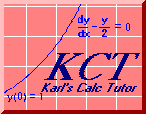

The problem was to find the derivative of
x2
f(x) = bx
2
If you let
x2
g(x) =
2
and
h(x) = bxthen we are certainly looking for the derivative of a product, so we apply the product rule. And it says that
g'(x) = xand using what you learned in this section, we have
h'(x) = ln(b) bxSubstituting g(x), h(x), g'(x), and h'(x) into the product rule, we have
x2
f'(x) = g'(x)h(x) + g(x)h'(x) = x bx + ln(b) bx
2
Observe that the right-hand expression has a common factor of
bx. Factoring that out we get
æ x2 ö
f'(x) = ç x + ln(b) ÷ bx
è 2 ø
Notice that when you take the derivative of a product of an exponential
with something else, the result is also a product of that same exponential
with another expression. In general if
f(x) = g(x) bxthen
f'(x) = (g'(x) + ln(b)g(x)) bxCan you see why?
email me at hahn@netsrq.com